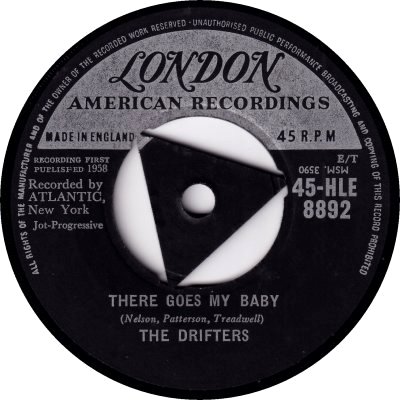
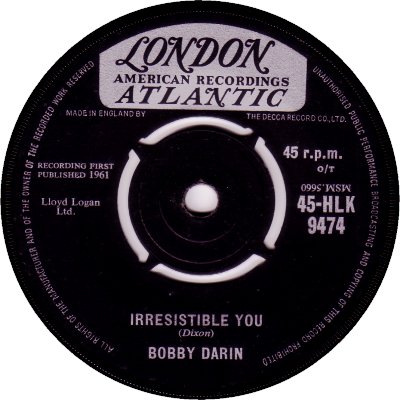
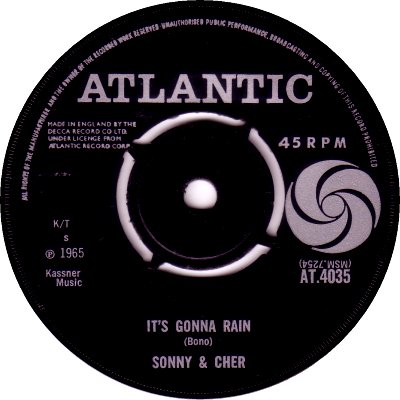
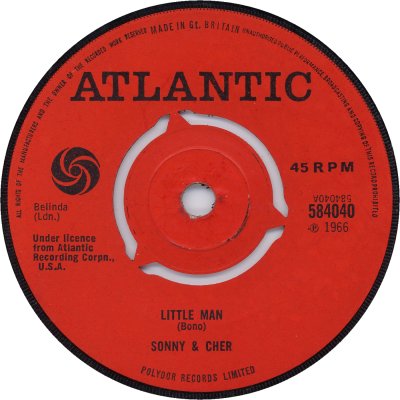
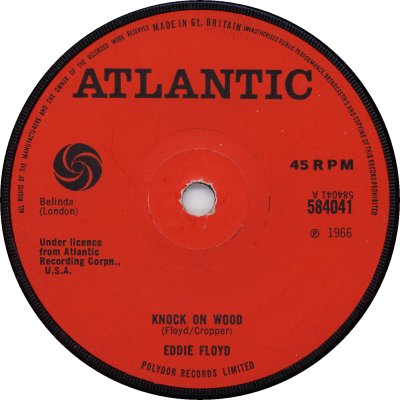
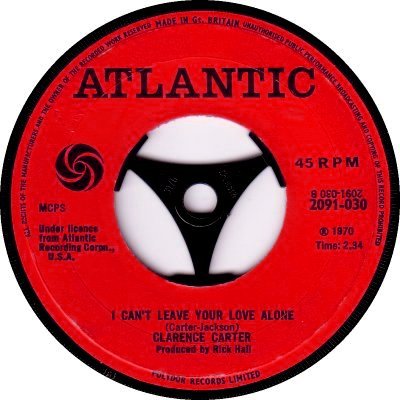
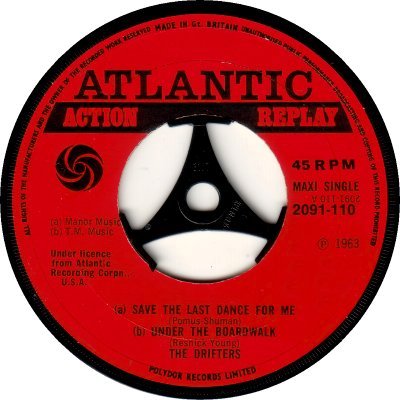
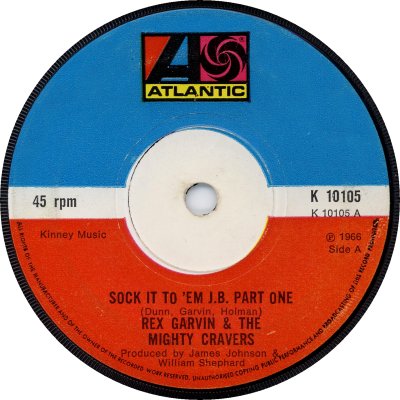
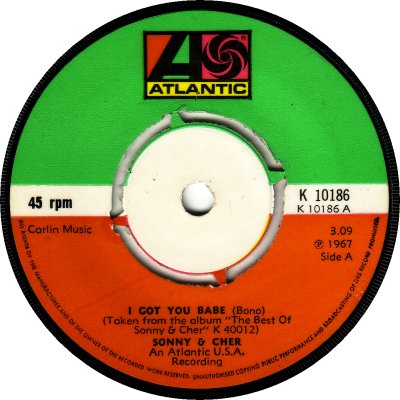
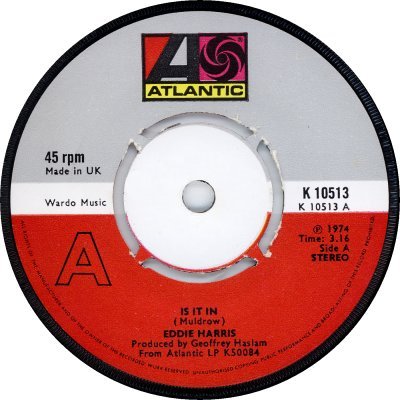
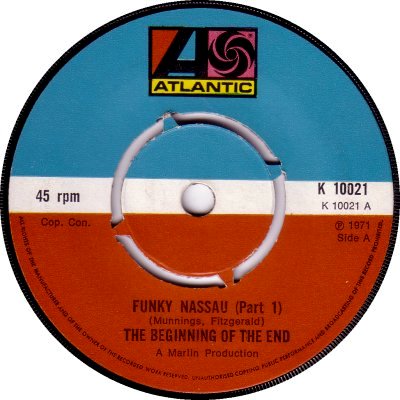
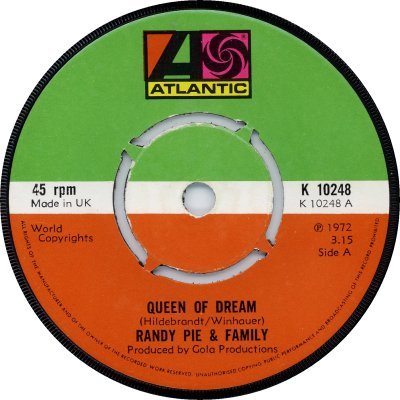
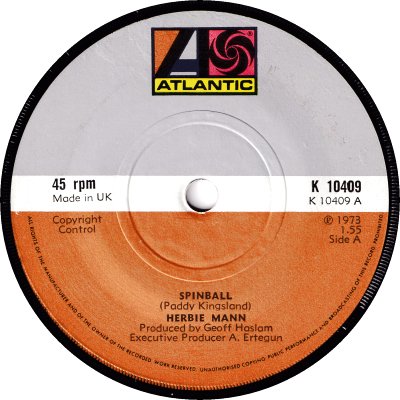
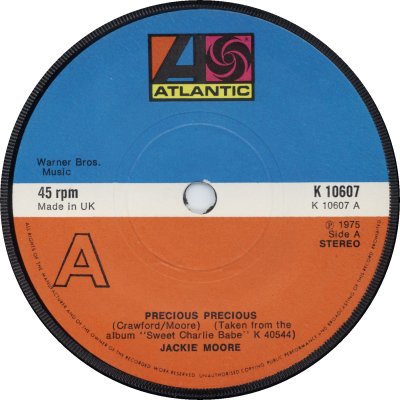
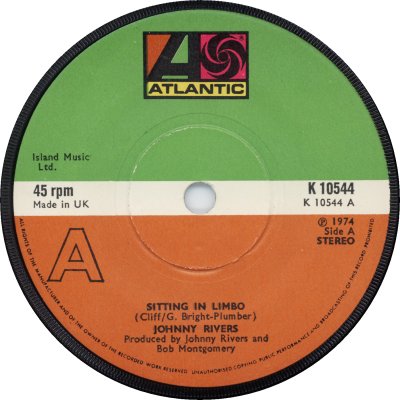
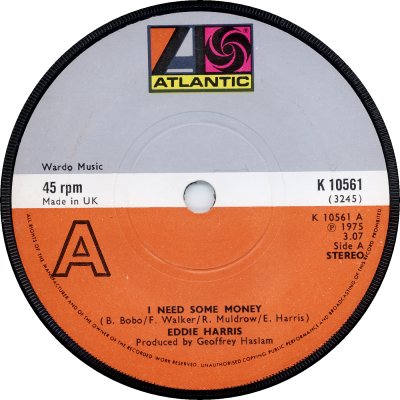
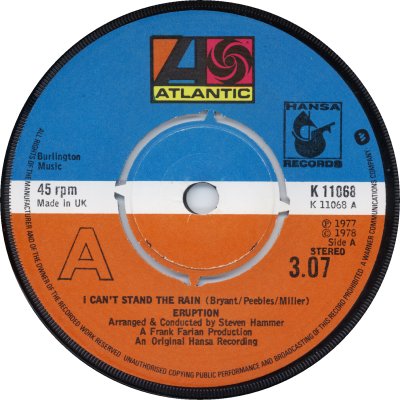
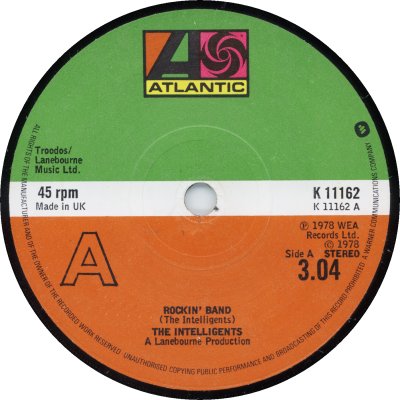
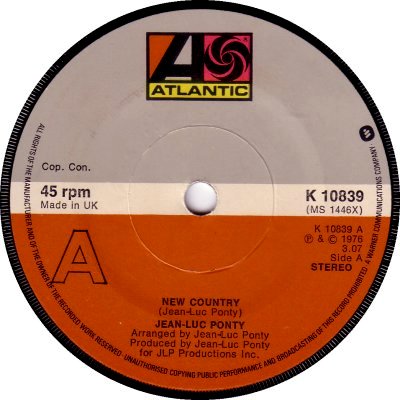
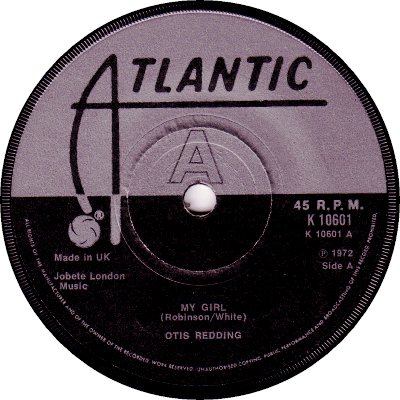
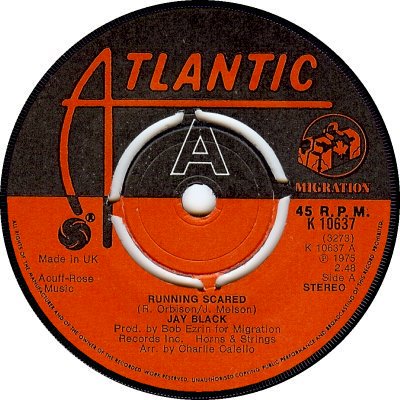
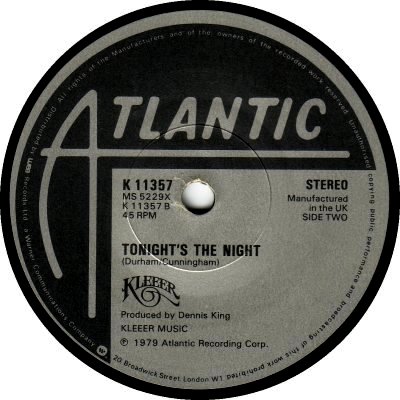
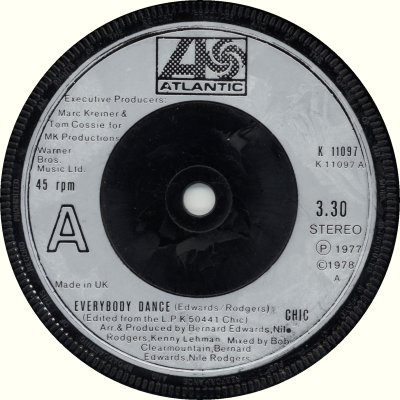
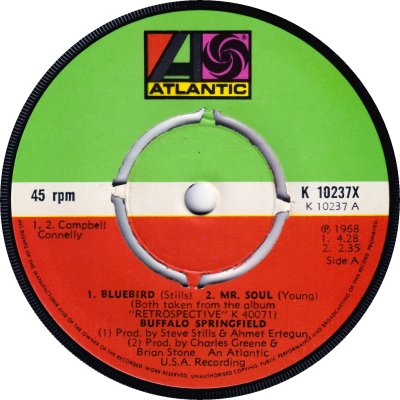
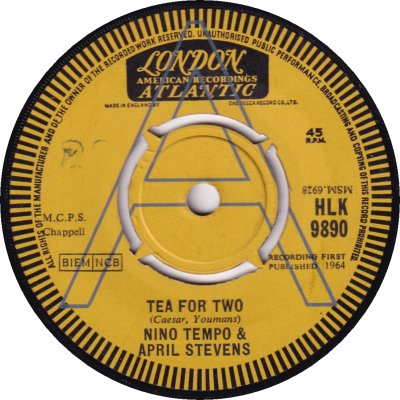
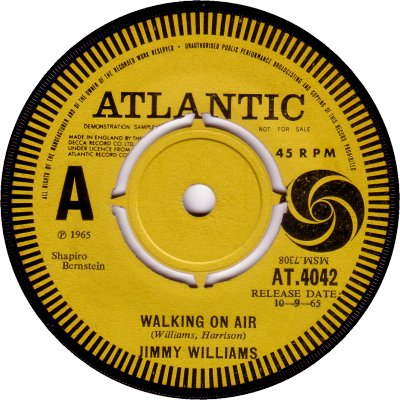
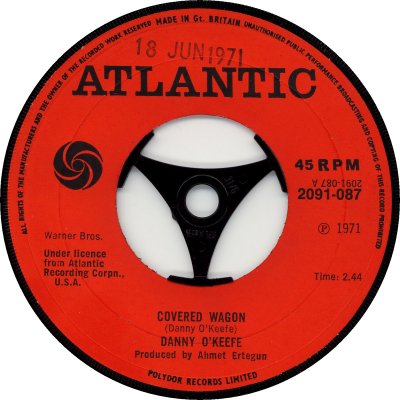
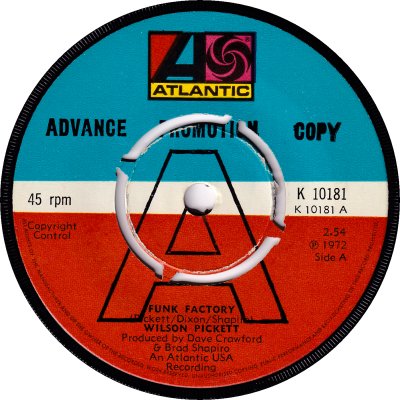
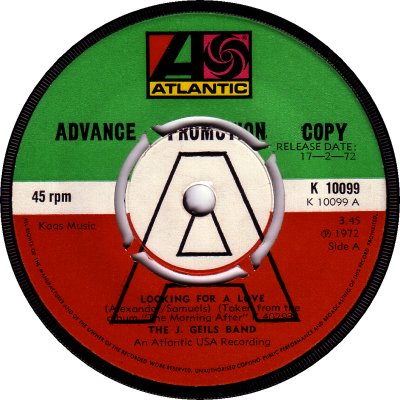
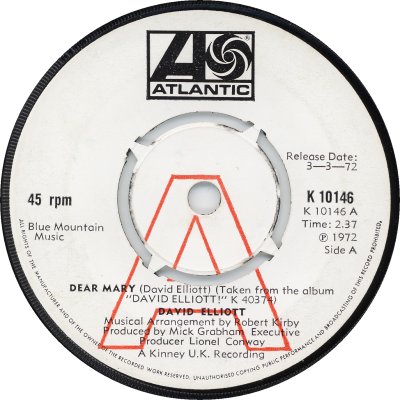
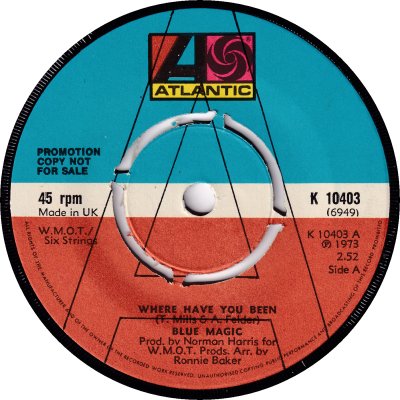
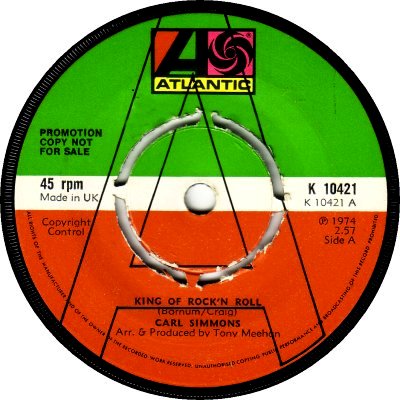
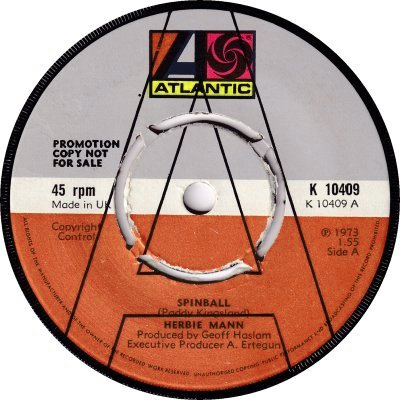
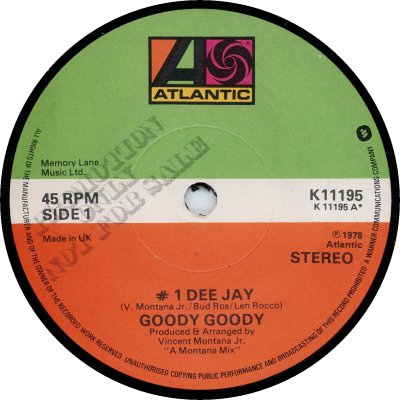
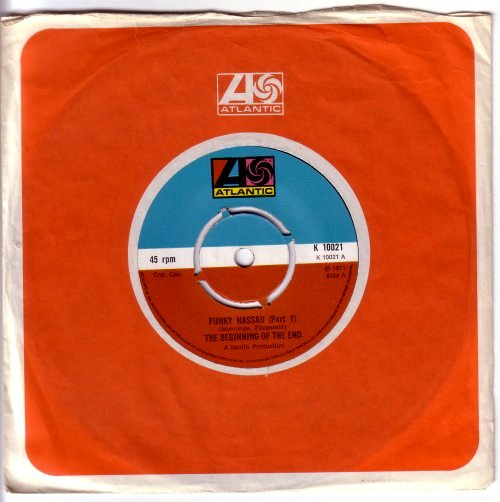
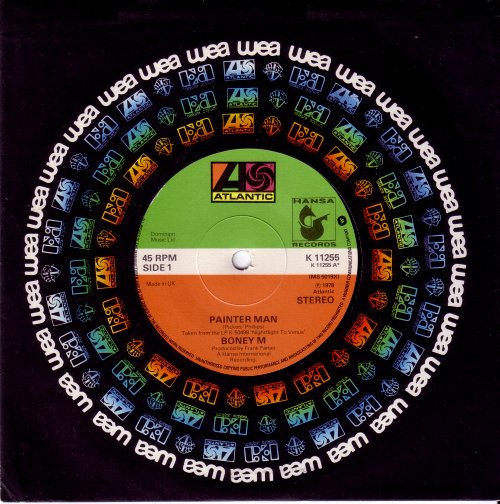
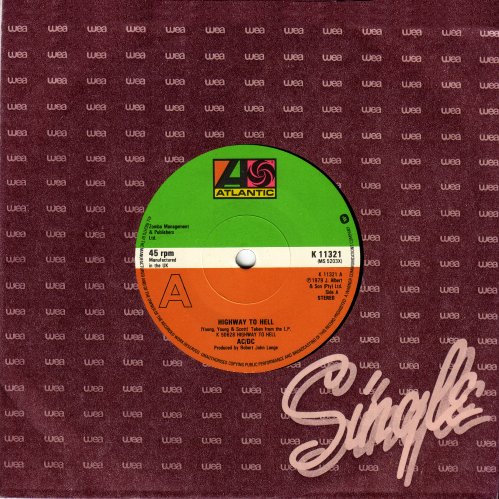
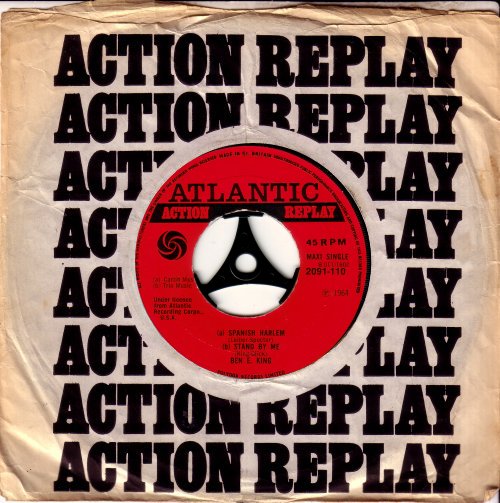
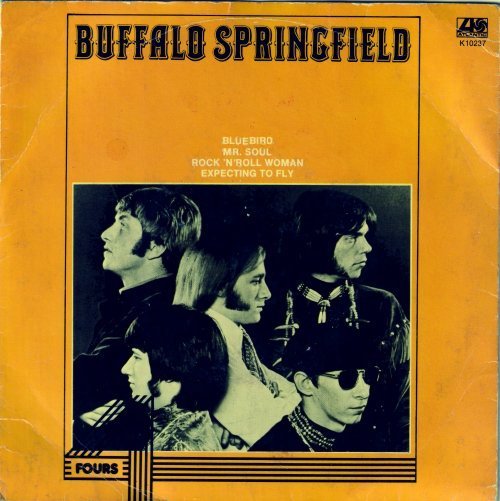
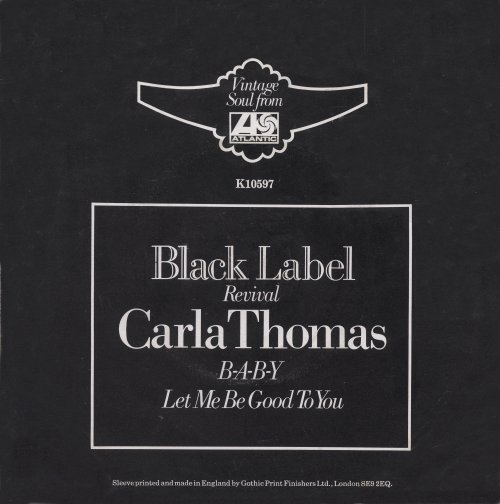
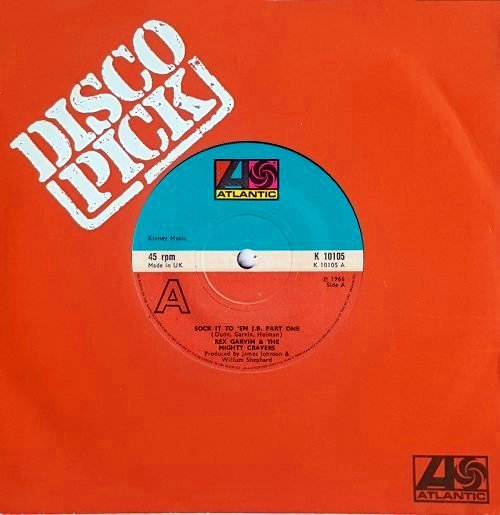
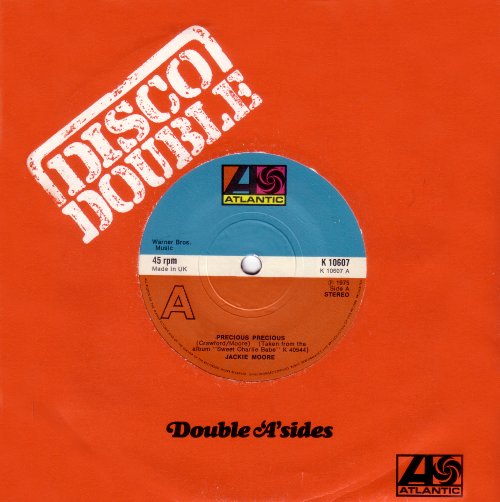
Formed in 1947 in New York City, Atlantic began life as an independent company specializing in Jazz and R&B and went on to become one of America's premier labels. 'Billboard' of the 17th of January 1948 announced that Atlantic was to make its debut 'next week'. The article said the the company had been organized by Herb Abramson (previously with National Records in an A&R capacity), Ahmet Ertegun and Dr. Vahdi Sabit, and that it claimed to have accrued 200 masters of 'Race' and 'Hot Jazz' records. Nationwide distribution was being set up. Atlantic had ambitions early on: 'BB' of the 6th of November noted that while it was known for being a 'Jazz-Race' label it had recruited composer Vernon Duke to direct a new series of recordings devoted to 'undeservedly neglected' Classical pieces. At that point Abramson was the company's president, with Ertegun as vice president. Some four months later 'BB' of the 26th of March 1949 reported that Atlantic was preparing to release its first album, 'This Is My Beloved', a collection of 'forthright' love poems by Walter Benson, on the 15th of April.
The scope of Atlantic's catalogue continued to widen during the remainder of 1949. 'BB' of the 3rd of September stated that after a year of dealing mainly with 'Blues -Rhythm' music the company was putting out its first 'Hillbilly' record that week; it had signed its first Country artist, Loy Gordon, and had an album of square dances set up as its next release. The following week came news that the company was launching a new label, Plaza. It was intended to feature Blues and Rhythm, like its parent, but different artists would be featured on it. The plan was for both labels to follow a regular release schedule of four discs monthly, which would enable each record to have the best promotional efforts dedicated to it. Jazz wasn't neglected: 'BB' of the 17th of September reported that a swap of Jazz masters had been arranged with Edouard Barclay of French company Blue Star Records, the main attraction for Atlantic being the acquisition of masters cut in France by American Jazz artists. In October Abramson and Ertegun made an extended trip into the South of the USA looking to sign Blues and Folk talent ('BB', 8th October); they returned in December having signed 'a flock' of new artists and having arranged distribution deals. An unusual sideline came in the form of sets of 10" novelty story records for children, which hit the shops in October. Each record had four possible starting points, which meant that the story line could go in many different directions depending on which groove the stylus found. The idea was Abramson's, and he was later to gain a patent for it. The first 'Magic Record Album' - as they were known - was 'The Ever-So-Many Adventures Of Johnny' ('BB', 22nd October 1949).
An ambitious move in May 1950 saw Atlantic signing a contract for a series of LPs that would feature the plays of Shakespeare, 'The Living Shakespeare Library'. 'BB' of the 27th quoted Ertegun and Abramson as saying that the move had been made possible by advances in the Long Play format. The article observed that Atlantic was the first independent to make a 'full-scale jump' into the field of complete LP recordings, and said that the development was a prelude to the company's entry into the Classical music market. Material of a less elevated kind was not forgotten. 'BB' of the 17th of June reported that twenty-four Hillbilly masters had been obtained; 'BB' of the 22nd of July commented that Ruth Brown, whose singles had proven very successful, had been re-signed to a better three-year deal; while 'BB' of the 26th of August reported that two cross-groove follow-ups to 'The Ever-So-Many Adventures Of Johnny' were planned - one would be a cowboy story, the other would feature Lil' Abner.
Early in 1951, Atlantic dipped its first toe into the Pop field, with the signing of The Clovers ('BB', 17th February). The following month 'BB' of the 24th of March revealed that the results of an experimental pressing of Ruth Brown's 1950 No.1 R&B hit 'Teardrops From My Eyes' in the 45rpm format had been sufficiently encouraging to spur Atlantic into full-blown 45 production. Fifteen popular back-catalogue items were being put out in the new format, and it was intended that in future all new releases would be issued in both 78rpm and 45rpm forms simultaneously. The seriousness of the company's move into the LP market was emphasized in June, 'BB' of the 30th breaking the news that thirty albums would be unwrapped at Atlantic's forthcoming convention. The genres covered would range from R&B through Pop, Jazz and Classical. A source of material for possible future releases was the catalogue of Jazz independent HRS, to which Atlantic had gained access; around 200 masters were involved, including ones by popular artists such as Jack Teagarden and Muggsy Spanier. Another acquisition was Jubilee Records, whose roster of R&B and female vocalists had their contracts transferred to Atlantic ('BB', 7th July). Towards the end of the year, spiritual group The Gospel Harmoneers were brought on board; 'BB' of the 24th of November remarked that in addition to its 'full' R&B line Atlantic was quite prepared to have a go with an off-beat idea. The next such, according to the article, was to be a series of albums featuring female nightclub singers.
Atlantic began to up its game in the LP area in 1952. 'BB' of the 5th of January reported that the company intended to schedule seven albums each month, covering Jazz, semi-Classical, Children's and 'specialty'; more 'Magic Sets' for children were to be included. Its interest in the Gospel and Spiritual genre grew: The Rosettes joined The Gospel Harmoneers on its roster ('BB', 23rd February), and then shortly afterwards a new line, Atlantic Gospel Records, was started - according to 'BB' of the 5th of April its first product would be out 'in a few weeks'. In a more secular vein, 'One Mint Julep' by The Clovers provided Atlantic with a big hit, and Ray Charles, another artist who was to be highly successful for the company, released his first single ('BB', 11th October). In addition, an advert in 'BB' of the 2nd of August claimed that three of the top five best selling R&B singles of 1951 had been on Atlantic. Ahmet Ertegun was quoted as saying that distribution was the key to successful selling; it was important to meet consumer demand in time to catch sales. In November of 1953 Atlantic introduced its first 'Binaural' album. The Binaural process was an early form of stereo; it involved recording from two points and using two styli to track two separate grooves simultaneously. The sounds were fed to two different amplifiers and heard through two separate speakers, giving the stereophonic effect. 'BB' of the 8th of November, commenting on the development, said that Binaural had been developed some three years or so previously. An album by Jazzman Wilbur De Paris was to be the first to be issued by Atlantic in that form; it would also be available as a standard disc. The intention was to release 'suitable' LPs in both forms. The company had demonstrated a Binaural disc system the previous year but hadn't disclosed any plans for its exploitation at the time ('BB', 8th November 1952). In the event the necessity for special equipment to play binaural records restricted their public appeal, and it was not till the advent of stereo discs which were compatible with the old mono systems that stereo records began to take off.
Successes in the R&B field continued to flow in 1953, as noted in various issues of 'BB'. That of the 14th of March observed that The Clovers had enjoyed six hits in a row, which was unusual for artists in that genre, and that the records had sold in excess of 175,000 copies each. The issue of the 24th of October reckoned that in the first nine months of the year six Atlantic singles had spent a total of fifty-six weeks in the Chart, the most successful of them being Ruth Brown's 'Mama He Treats Your Daughter Mean', which had been on the Chart for seventeen weeks. 'BB' of the 19th of December marvelled that both 'Mama...' and another Brown hit, 'Teardrops From My Eyes', had sold more than 400,000 copies each, which was 'sensational' in the R&B genre. Other big sellers were 'Good Lovin'' by The Clovers, 'Honey Hush' by Joe Turner, and 'Money Honey' by Clyde McPhatter & The Drifters. Aside from singles there was action in a new area, that of EPs. Describing them as 'The new craze in Jazz', 'BB' of the 5th of September said that Atlantic had transferred fifteen items to EP form and had another ten lined up. Elsewhere, on the management front a there was a development that was to prove more important than the arrival of the EP format: Jerry Wexler joined the company as a partner. According to 'BB' of the 30th of May he was to work with Ahmet Ertegun in all aspects of the business. He had purchased 'substantial amounts' of stock and had been installed as vice president. At that time Herb Abramson was absent on Army service.
In April 1954 another label, Cat, joined the Atlantic stable. Initially dedicated to R&B, it was to prove fairly short-lived, expiring in late 1955 after fewer than twenty releases, but it provided the company with its first 'crossover' hit in the shape of 'Sh-Boom' by The Clovers, which featured in the main Pop Chart as well as the specialist R&B one ('BB', 3rd July). Following on from a successful 1953, Atlantic continued to dominate the R&B Charts. 'BB' of the 7th of August observed that there were seven Atlantic singles and one Cat in the top eleven placings of that chart, and 'BB' of the 13th of November, looking back at the year, said that six Atlantics and that same Cat had featured in the Top Ten of a 'Most Popular Singles' poll among R&B DJs. Ahmet Ertegun's brother Nesuhi joined the board of Atlantic at the end of 1954, as a partner and vice president. Previously with Jazz concerns Good Time Jazz and Contemporary, he was to go on to play a leading role in Atlantic's Jazz wing. At that time other members of the board included vice-presidents Ahmet himself, Wexler and Miriam Abramson; Miriam was the wife of president Herb Abramson, who was still on leave from the company and was serving with the U.S. Air Corps ('BB', 1st January 1955).
1955 saw the introduction of another new label. According to 'BB' of the 23rd of July, it was to be called 'Atlas'; it was to feature Pop and R&B, and it was to be distributed separately from Atlantic. An early Atlas single was to be by Joe 'Mr. Piano' Henderson, which had been licensed from UK company Polygon. The 'Atlas' name didn't last long: 'BB' of the 6th of August reported that another company of that name was already in existence and that Atlantic was having to come up with a replacement. The following week 'BB' of the 13th of August was able to report that, following a 'last-minute' name change the new subsidiary had been launched as Atco. The article was able to confirm that the material on it was to be a mixture of Pop and R&B, and that the distributors would be different to that of the main Atlantic label. The Cat label appears to have been discontinued not long afterwards. 1955 seems to have seen a temporary lull in terms of R&B successes: 'BB' of the 29th of October observed that Atlantic was back in the Chart with three new entries after having been absent for several weeks - the first time in several years that it had been off the Chart for even a short time. The company had however been profitably busy on others fronts: 'BB' of the 12th of March 1955 commented that its publishing arm was notably successful, and some eight months later Atlantic did a deal with Spark Associates - Mike Stoller, Jerry Lieber and Lester Sill - which involved the Spark label being discontinued, its masters being transferred to Atlantic, and Stoller, Lieber and Sill writing / acquiring song material to be recorded for Atlantic and its subsidiaries. Finally an agreement signed with Decca of the UK in October under which that firm handled selected Atlantic product was upgraded; 'BB' of the 12th of November 1955 was able to say that British Decca was now taking every Atlantic release.
The signs in 1956 were promising. Presumably thanks to Nesuhi Ertegun, Atlantic's Jazz arm started the year with a flourish, announcing eight new signings including the Modern Jazz Quartet and female singer Chris Connor ('BB', 28th January). It was given another boost in June: 'BB' of the 9th reported that Swedish company Metronome had acquired the rights to Atlantic's Jazz product for Sweden, Norway, Denmark, Finland and the potentially big market of West Germany. Non-Jazz items were also doing well: Atlantic's over-all sales for December 1955 had set a new record, but sales in January 1956 broke it immediately ('BB', 16th February). An increasing part of those sales was down to 45s - 'BB' of the 14th of April quoted Miriam Abramson as saying that 45s were now responsible for 75% of singles sales, whereas a year ago 78s had been outselling them by 2 to 1. An attempt was made to make subsidiary Atco as big as its parent: 'BB' of the 23rd of June told its readers that Herb Abramson - who was back in office by that time - had taken over the A&R and sales responsibilities for it as part of the effort. He intended to build up the label's R&B, Rock 'n' Roll and Pop stable, while Ahmet Ertegun and Jerry Wexler were to concentrate on A&R for Atlantic, with Nesuhi Ertegun looking after the Jazz and album areas. An album of recent Rock 'n' Roll hits, 'Rock 'n' Roll Forever', was issued in October and sold very well; 'BB' of the 13th remarked that neither Atlantic nor any other label was issuing R&B albums. At the end of the year, 'BB' of the 26th of December noted that Atlantic and Atco between them had been responsible for twenty R&B Chart singles out of a total of eighty-seven for the year, with the help of multiple hits from Joe Turner (3), The Drifters (3), Ray Charles (3), The Clovers (2) and Chuck Willis (2). 'BB' of the 2nd of February 1957 added that the company's publishing arm, Progressive Music, had been the top publisher of 1956.
A sequel to the 'very successful' album 'Rock 'n' Roll Forever' was released in February 1957 ('BB', 23rd). A couple of weeks later, 'BB' of the 9th of March credited Atlantic with being in at the birth of Rock 'n' Roll, saying that a few years ago the company had fused elements of R&B with Pop which had led to Rock 'n' Roll; the article said in passing that the move had not been made with the intention of cracking the 'white' market. Talent continued to arrive: 'BB' of the 24th of June described new signings Lloyd Price and Bobby Darin as 'impressive', and Darin in particular went on to register an admirable number of hits for Atco. Price's material came out on his own label, KRC Records. A fourth label, East-West, made its debut in September, with three new singles by three new acts. According to 'BB' of the 30th, it was to feature Pop, R&B, Rock 'n' Roll and Rockabilly and was to be handled by different distributors to those of Atlantic, Atco and KRC. Masters had been acquired and artists signed 'for some time' in anticipation of the launch. An advert in 'BB' of the 14th of October explained that East-West had been created because Atlantic had acquired a number of artists of 'such unusual interest' and wanted to give them the 'special exploitation' that they deserved. Sadly, East-West was not particularly successful and it was shelved in the spring of 1959.
1958 began pleasingly with a special '10th Anniversary' feature on Atlantic in 'BB' of the 13th of January. A notable development came in May with the release of the company's first three stereo LPs ('BB', 26th) - according to the article Atlantic had been recording everything in stereo for the past three years. Separate stereo and mono versions of albums were to remain the norm for some time. 'BB' of the 9th of June was in a position to state that May had been Atlantic's second biggest month for sales in its existence, with sales of over a million units. Four hundred thousand copies of 'Yakety Yak' by The Coasters had been shifted over several weeks, and Bobby Darin's 'Splish Splash' was taking off. Both were on Atco. There was a departure towards the end of the year: Herb Abramson sold his interest and left to start his own label, Triumph. Atlantic's board now consisted of Ahmet Ertegun as president, with Jerry Wexler executive vice president and general manager, Nesuhi Ertegun vice president in charge of the album department, and Miriam Bienstock - who had recently divorced Abramson and married publisher Freddy Bienstock - vice president of the company and president of its publishing arm.
Sales records continued to be broken in 1959. 'BB' of the 2nd of February pointed out that the company had sold 470,000 records the previous week, and in the summer 'BB' of the 8th of July commented that it was having one of the hottest sales periods in its history, as illustrated by the fact that there were five Atco singles in the Hot 100 and another one had just slipped out of the reckoning. Presumably as a result of Atco's flourishing, there were plans to develop it as an album label; it had dealt mainly in singles until that point ('BB', 10th August). 'BB' of the 24th of August confirmed that July had been Atlantic's best month ever, and had been the second consecutive month in which gross sales of more than $1m had been recorded. In addition, LP sales for the first six months of 1959 were up by 60% over the same period in 1958. On the down side, EP sales had been 'unimpressive' but even they were 'on the upswing'. In the autumn a new label joined the company's fold: Trey was founded in conjunction with Lester Sill and Lee Hazelwood, independent producers based on the West Coast. It didn't last particularly long and put out the last of its seventeen singles in April 1961.
Atlantic took the first steps towards establishing its own identity worldwide in the spring of 1960; 'BB' of the 4th of April said that Nesuhi Ertegun had visited England, France, Germany and several other countries with that aim in mind. He was only partially successful in the UK, where Atlantic records were given a logo reminiscent of a headstone, with the 'London' name taking precedence but Atlantic's name featuring far more prominently than it had done before (2). Back in the States a degree of success for Jazz singles led to more of them being scheduled for release, with their own numerical series ('BB', 29th August); elsewhere the company continued to spread its net ever wider with the launch of a series of 'Southern Folk Heritage' LPs ('BB', 14th November). Perhaps inevitably, Atlantic's success saw it being eyed by would-be buyers. The following year 'BB' of the 8th of May 1961 carried a denial from Ahmet Ertegun that its sale had been agreed; talks had been carried out with several firms but no deal had been reached and there was no immediate prospect of one. A few weeks later came the news that Atlantic had undertaken its first distribution deal, and would be handling the products of the Satellite label, of Memphis. Atlantic had purchased masters from Satellite in the past, but in future Satellite records would be on the Satellite label ('BB', 29th May 1961). Three months or so later, 'BB' of the 11th of September announced that Satellite had changed its name to Stax. There were a couple of late points of interest in 1961. Firstly 'BB' of the 11th of December revealed that Atlantic had just wrapped up the most successful year in its history, with combined sales of Atlantic, Atco and Stax up by 50% in albums and 45% in singles; and secondly 'BB' of the 18th reported that the company intended to join the current 'Twist' craze - it had a Ray Charles LP in the Charts and the intention was for others by the likes of Bobby Darin to follow it.
The new 'distribution' role of Atlantic developed slowly in 1962, with the company handling individual items from Lu Pine (of Detroit) and Campus (of Philadelphia) on their original labels ('BB', 27th January; 7th July); it also agreed to handle the Allwood label, of Atlanta ('BB', 6th October). Atlantic's own label for Twist records, 'Twis-Time', made its debut in February with three singles ('BB', 24th) but it was doomed to have a short life. Those first three singles turned out to be the last, and 'BB' of the 26th of May stated that it had been 'quietly halted' as the fad appeared to be on the way out. The year was another successful one: 'BB' of the 29th of December was able to report another record-breaking year of sales, worth $7m gross to that point; it added that Acker Bilk's 'Stranger On The Shore', on Atco, was heading for 1m copies sold. Ahmet Ertegun attributed the company's progress to a combination of hot product, diversity of product, important overseas acquisitions, potent distribution agreements with other labels, expanded album product, and the advancement of a number of new talents. The same issue carried denials from representatives of both Atlantic and Avnet Electronics that there would be any merger between Atlantic and Avnet's label 'Liberty'; nor would there be any outright purchase of Atlantic by Avnet. The Atlantic spokesman went on to claim that the company might be looking to make its own acquisition.
The market for singles experienced something of a slowdown in the first half of 1963. 'BB' of the 6th of June describe it as 'soft' and quoted Jerry Wexler as saying that he believed sales across all the companies were 35% to 50% down. Atlantic planned to combat this by putting even greater efforts into its promotional activities and increasing the number of its releases that had hit potential. The company was still doing well in the Charts: 'BB' of the 20th of July said that it was enjoying one of its hottest periods for some time, with seven singles in the Hot 100 and another one bubbling. Whatever Atlantic did in order to increase singles sales seems to have paid off: 'BB' of the 5th of October was able to state that on one particular day it had sold 80,000 of them. In the autumn there were more rumours about a possible sale or merger, this time involving the Cosnat Distributing Corporation; they were 'vigorously denied' by Wexler ('BB', 26th October), and came to nothing.
Atlantic's foray into distribution continued to grow in 1964, with first the Heidi label ('BB', 19th September) and later Dial ('BB', 14th November) coming under its wing. There were also discussions with Chris Blackwell of UK company Island about distributing his new label, which was to be known as 'Aladdin' in Britain and 'Impact' in the States ('BB', 12th December), but nothing appears to have resulted from them. Atlantic's recovery in the area of singles continued: 'BB' of the 9th of May observed that it was occupying seven places in the Hot 100 with another three records bubbling. The slowdown beforehand was attributed to the 'surge' of The Beatles and other UK acts, which 'BB' reckoned might be ebbing. 'BB' of the 7th of November commented in passing that Atlantic had grown from a label producing minority appeal product into one of the major record companies, offering a wide and diversified catalogue of albums and singles. On the artist front, one development which was to prove significant was the release of the first single for the label by Wilson Pickett ('BB', 13th June).
More distribution deals were done in 1965. Nashville label Sims came on board, marking a big step into the Gospel and Country fields for Atlantic; the Sims catalogue was an extensive one and also extended to Blues and Pop ('BB', 13th March). Other arrivals were Loa, Sunburst ('BB', 5th June), Seafair-Bolo ('BB', 31st July), and York, the latter supplying records by Sonny & Cher ('BB', 28th August). The same issue of Billboard which reported the agreement with York was also able to say that Sonny & Cher's 'I Got You Babe' had hit the top spot in the Hot 100, on Atco. Rumours about a possible sale continued to circulate: in 'BB' of the 5th of June, Jerry Wexler dismissed reports that a sale was being negotiated and said that while many approaches had been made over the past five years no deal had been made, none was pending and none was in prospect. A couple of months later it was Ahmet Ertegun who issued a denial, this time in 'BB' of the 28th of August. He reiterated that no negotiations were under way and that none were contemplated; he added that Atlantic was in the middle of a long-term expansion programme, and that if anything it was looking to make purchases itself. Perhaps as part of that programme it introduced a new budget LP line, Clarion ('BB', 19th June), and a new Gospel line, Chapel Records ('BB', 28th August). Another step involved Atlantic in the discotheque scene, with the release of a series of albums featuring dances such as the Frug, the Watusi, the Swim, the Shake and the Bossa Nova ('BB', 6th March). Singles continued to set new sales records for the company: 'BB' of the 31st of July stated that the various Atlantic labels had shifted 400,000 units between them the previous week. November saw the release of the first single by The Young Rascals ('BB', 27th November), who would shift a lot of records and would help to bolster the company's presence in the Pop / Rock market.
1966 kicked off with the encouraging news that Sonny & Cher's album 'Look At Us' had sold 600,000 copies in two months, grossing over $1m in the process. The spring saw a change in Atlantic's arrangements in the UK: 'BB' of the 9th of October 1965 had reported on a visit paid to this country by Jerry Wexler for the purpose of negotiating the company's deal with Decca. At that time, Wexler had said that Atlantic was happy with the service provided by Decca and that it valued the 'long and productive relationship' between the two. However, 'BB' of the 26th of March 1966 broke the news that Atlantic had signed a long-term licensing deal with Polydor for the UK. The deal included Atlantic getting the rights to British Polydor product for the States, which, it was hoped, would be another major step in Atlantic's expansion. The move paid off: 'BB' of the 17th of September noted that Atlantic was the hottest American label in the UK at that point, with Sonny & Cher's 'Little Man' and 'When A Man Loves A Woman' by Percy Sledge leading the charge. On a visit to Britain for talks with Polydor about increased marketing for albums, Ahmet Ertegun said that he was 'delighted' with the way that Polydor was handling Atlantic product. Back in America, the company had continued its diversification by introducing a Spoken Word label, Verbum, dedicated to contemporary works of drama and poetry ('BB', 16th July). The following month 'BB' revealed that Atlantic's album sales were up by approximately 100% on the first seven months of the previous year ('BB', 27th August), but how much of the increase was down to Verbum is open to question. Towards the end of the year bootlegging of popular singles became a problem, for Atlantic and for other companies; in response Atlantic was considering making its label designs more colourful, which would make them more difficult to duplicate ('BB', 19th November). Finally for 1966, Atlantic made another big signing, in the form of Aretha Franklin ('BB', 3rd December).
Bootlegging of singles became more widespread and more of a problem in 1967. There was more talk about Atlantic redesigning its label in 'BB' of the 29th of July, but nothing concrete seems to have happened. There were enough hit Atlantic singles for the bootleggers to work on: 'BB' of the 17th of June pointed out that the company and its affiliates and distributed labels were occupying eighteen positions in the Hot 100, including the top two places, and had three more threatening to chart, with a wide range of genres represented. Aretha Franklin was doing her bit to contribute to Atlantic's success: 'BB' of the 30th of September, reporting on the release of her fourth single for the company, reminded its readers that the previous three had all gone gold. Work on the broadening of the company's scope continued. On the artist front there was a drive to build up its roster of Rock groups, including some from the West Coast which were said to be bringing a 'mystical quality' to music and taking it 'a bit further from the roots of Rock 'n' Roll' ('BB', 27th May). 'BB' of the 17th of June was able to point to the presence on Atlantic's books of Iron Butterfly, Cream, Buffalo Springfield and Vanilla Fudge as evidence of its growing involvement in the 'Underground' movement. On the label front a new 'Country Pop' label, 'Jab', was formed in association with Buddy Killen and Jack Stapp, out of Nashville ('BB', 18th February). Jab's records were to be recorded in Nashville under Killen's supervision. In the event, Jab lasted for some fourteen months or so, and put out fifteen singles. Atlantic's history was not neglected: a 'Classic Series' of vintage material on singles was launched in the summer ('BB', 24th June). During 1967 albums began to make a bigger impact: 'BB' of the 19th of August observed that they were threatening to outdo singles as a launch pad for Pop artists, and added that the emergence of R'n'B artists as big album sellers had contributed to Atlantic's 'upward sales spiral'. There were some reorganization of managerial functions: Tom Dowd was promoted from chief recording engineer to vice president in charge of engineering, and Henry Allen, who had been with Atlantic for fourteen years, was made vice president of promotion ('BB', 29th July). In October, however, it was revealed that the long-rumoured sale of Atlantic was at last going to take place. The buyers were to be the Warner-Seven Arts company. The deal covered both Atlantic and its affiliates; it had been agreed in principle and was due to be concluded over the course of the next few weeks. Under it, Atlantic would operate as a separate division, with no change to its current management, distribution arrangements, international licensees, and artists. Jerry Wexler and Ahmet Ertegun would continue to direct policy under a five-year contract ('BB', 28th October). The acquisition deal was signed on the 24th of November ('BB', 2nd December).
Thus it was that Atlantic launched into 1968 as a practically autonomous subsidiary of Warner-Seven Arts. The first big step to be taken in the new year was an investigation into Howard Holzer's 'Compatible Stereo Generator' system; the system claimed to enable the playing of stereo records on mono equipment without any loss of balance or sound quality ('BB', 20th January). The trials must have gone well, for 'BB' of the 30th of March was able to say that the company had released its first two CSG stereo singles and had its first CSG stereo albums scheduled for release in April. Atlantic took an ad in 'BB' of the 6th of April to announce the advent of CSG stereo records. As they were reckoned to be compatible with mono equipment the manufacture of mono records was to be discontinued, and catalogue items in mono were to be remastered in CSG stereo when stock ran out.
A move which was to prove less successful came in June when 'BB' of the 1st revealed that Atlantic, Warner-Seven Arts and stablemate Reprise were to join with a company called the Americom Corporation to introduce 'Pocket Discs' regionally. The new discs were 4" in diameter and were made of flexible vinyl; they played at 33 1/3 rpm and were intended for use with a two-speed player / radio made by Toshiba Industries. Singles were to be released simultaneously in the 7" and 4" formats. Test marketing took place in the Pacific Northwest, beginning in early October ('BB', 5th), but despite initially promising results the format failed to catch on and Pocket Discs bit the dust in 1969. Their small size meant that they couldn't be played on decks with auto-return arms, which can't have helped, and the sound quality was poorer than that of ordinary singles. In addition, cassettes and portable cassette players were beginning to grow in popularity and were providing competition.
Happily for Atlantic, sales of standard records continued to grow throughout 1968. 'BB' of the 20th of April was able to say that the first three months of the year had been the greatest three-month period in the company's history, with sales up 200% on the same quarter of 1967. Stax parted company with Atlantic in May, but left behind catalogue material that could be repackaged on Atlantic or Atco ('BB', 11th May). A couple of months after Stax's departure there was an arrival in the shape of the Cotillion label. According to Ahmet Ertegun it was intended to feature new signings and would be putting out both albums and singles. The music featured would cover R&B, Rock and Jazz ('BB', 13th July). There was a hiccup late on in the year, when it was found that the CSG records mentioned a couple of paragraphs above only worked with modern or expensive players - a lot of customers and radio stations were still using 'dated' equipment. As a result, a planned complete switchover to CSG records was delayed ('BB', 14th December). The hitch doesn't seem to have affected sales too badly: at the end of the year 'BB' of the 29th of December reported that they had been up by 85% over the previous year. In addition the company had scored twenty-three gold discs - the highest total since RIAA records began - and had had twenty to thirty LPs in the Chart every week.
The big development of 1969 was the purchase of Warner-Seven Arts - including Atlantic - by the Kinney Corporation, in June. New owner Steve Ross kept the successful management team on board with a firm promise of no executive interference, a promise which he seems to have honoured. Elsewhere, there was something of a lull on the sales front. 'BB' of the 8th of August noted that sales of singles had been in decline, but carried a quote from Nesuhi Ertegun to the effect that he was confident that they would survive. Bootlegging remained a worry; 'BB' of the 27th of December observed that pirated 8-track tapes were a particular problem and that Atlantic had been in consultation with its lawyers. A couple of months later, in the new decade, 'BB' of the 28th of February 1970 warned that Atlantic intended to stop supplying records to distributors who were found handling pirated tapes, and that the company was going to take 'all possible steps' to protect its interests. Other happenings in 1970 included the purchase of Elektra Records by Kinney, which brought the Elektra label on board, and the release of a triple album set of 'Woodstock' in May which sold 750,000 copies by the start of August (both reported in 'BB', 1st August) and went gold not long afterwards. In all, the first six months of 1970 brought six gold records to the company and provided it with the best six months in its history ('BB', 29th August). There was a promotion for Ahmet Ertegun, who became executive vice president of the entire Warner Brothers Music group, which covered the Warner Bros., Reprise and Elektra labels as well as Atlantic and its associates ('BB', 1st August 1970). Less welcome was the news that with Polydor expanding its activities in the USA, product originating with British Polydor would cease to be available to Atlantic in the States in April 1972.
The prospective loss of the Polydor material was offset to a certain extent by the acquisition of the distribution rights to the new Rolling Stones Records label in April 1971 ('BB', 17th), and by the formation of a new label, Asylum, in co-operation with David Geffen. 'BB' of the 7th of August 1971 stated that Asylum would be run independently and that its first releases were planned to appear in late August or early September. A lesser arrival was the Clean label, formed by Ahmet Ertegun, Robert Stigwood and Earl McGrath ('BB', 9th October) - it went on to issue only a small number of records before expiring in 1973. In order to deal with labels which were being handled by Atlantic but not owned by the company a 'custom label division' was set up, with Johnny Bienstock in charge; at the turn of the year those labels were Rolling Stones, Clean, Chimneyville, Embryo, Capricorn, Win Or Lose, and Pelican. 1971 was another very successful year, with sales up 10% and twenty-four records - eleven singles and thirteen albums - going gold ('BB', 15th January 1972). Externally, some relief from the bootleggers came in October when an Antipiracy Bill was signed, granting a limited copyright to record companies.
Some changes of name took place in the spring of 1972. Atlantic's parent company Kinney Services Inc. became Warner Communications Inc., and the associated Kinney Music International became WEA Music International ('BB', 11th March), the initials of 'WEA' standing for the three major labels, Warner Bros., Elektra and Atlantic. The acquisition of Elektra had left Warner / WEA well represented across most of the music spectrum, but it appears to have seen Country music as a weak spot. 'BB' of the 16th of September 1972 broke the news that Atlantic was going to make another effort to crack that market. Jerry Wexler had been in the South and Southwest and had begun acquiring masters and signing artists, with the aim of building up a substantial depth of Country product, and a division dedicated to the genre was being structured under Corky Mayberry. In addition, 'BB' of the 10th of October added that Atlantic was opening an office in Nashville. The company's roots were not neglected: a licensing deal with Jazz label Commodore provided a lot of classic material for reissue ('BB', 22nd April 1972). An agreement which was to prove more profitable was a distribution deal with RSO Records, which was signed in that same year ('BB', 2nd December) and bore its first fruits early the following year. Another development, reported in 'BB' of the 25th of November, came when Asylum was bought by Warner Bros. It appears to have remained associated with Atlantic for some months afterwards, and was credited with helping to make 1972 Atlantic's most prosperous year, complete with a total haul of 22 gold records ('BB', 6th January 1973). On the bootlegging front, perhaps fortified by the new Antipiracy laws, in the summer Atlantic took legal action against three firms and six individuals for pirating its material ('BB', 24th June).
The emergence of Quadraphonic Sound in 1973 brought with it problems of compatibility. There were several different systems, some of which were compatible with stereo while others were not. The one used by WEA was non-compatible, which meant that certain albums had to be issued in both quad and stereo forms ('BB', 10th May). The compatibility problems caused by the multiplicity of systems appears to have helped to sink quadraphonic, and it disappeared before the end of the decade. On the label front, Asylum moved to Elektra in the summer, to form Elektra-Asylum, while on the 'plus' side Atlantic gained the rights to distribute British labels Virgin ('BB', 22nd September) and Charisma ('BB', 3rd November). There was a measure of success in the Country field, with twelve hit singles and two hit albums being registered by the time autumn came around ('BB', 27th October), but it was not enough. Early the following summer 'BB' of the 29th of June 1974 broke the news that Atlantic's head of A&R in Nashville had departed; some three months afterwards 'BB' of the 14th of September revealed that the entire Nashville office had been closed down, leaving the future of the Country artists on Atlantic's books in doubt. The article commented that the office had been in operation for around twenty months and that its closure meant that Atlantic was the first WEA company to 'call it quits' after attempting to build up a Country division.
Despite Atlantic having to admit defeat as far as Country was concerned, 1974 brought some positive news. 'BB' of the 11th of May observed that sales were up 20% on the same quarter as the previous year, with Yes, Emerson Lake & Palmer, Genesis and Mike Oldfield boosting the figures. That same month, Atlantic gained distribution rights to Swan Song, the new label started by Led Zeppelin and their manager Peter Grant ('BB', 18th May). Another acquisition, mentioned in the same issue of 'BB' as that of Swan Song, was less immediately meaningful but was to pay off in the long run: Atlantic gained the American and Canadian rights to Abba recordings. The group's Eurovision winner 'Waterloo' was rush released as a consequence. 'BB' of the 6th of July reported that a big internal restructuring was to take place at WEA, with Atlantic and Elektra-Asylum merging operations apart from their promotion and A&R departments, which were to remain separate. The new company, Atlantic/Elektra/Asylum, was to be headed by Ahmet Ertegun, with David Geffen as co-chairman and Jerry Wexler as vice president. The development appears to have run into terminal difficulties: 'BB' of the 31st of August said that its implementation had been postponed and that a six-month study period was taking place; for the time being the two companies would continue to operate as separate companies under their old names. They continued to do so after the end of the study period, and no more was heard of Atlantic/Elektra/Asylum. There were however some managerial changes towards the end of the year: Ahmet Ertegun was promoted from label president to chief executive officer and chairman of the board, with Nesuhi Ertegun and Jerry Wexler stepping up from executive vice presidents to vice chairmen ('BB', 9th November). Wexler's tenure turned out to be a fairly short one: in August 1975 he left to take up a consultancy post with parent firm Warner Communications.
'BB' of the 18th of January 1975 praised Atlantic for being an 'outstanding example' of a label that had changed its artist roster in order to keep up with record-buyers' changing tastes. An example of that adaptability was not long in following, as the company began to get increasingly involved with Disco music. The Cotillion label, which had been dormant since the end of 1972, was revived and rebranded and used as an outlet for Disco / Dance material. In addition Atlantic pressed its first 12" singles, but initially only for promotional purposes: 'BB' of the 16th of August noted that discos were being supplied with 12" test pressings of The Trammps' 'Hooked For Life'. 'BB' of the 6th of September said that Atlantic's growing interest in the genre had been sparked by the success of 'Soul Makossa' by Manu Dibango and Herbie Mann's 'Hijack' singles, and added that 12" singles were being sent to clubs and DJs as part of its promotional push. The push was successful, and within eighteen months 'BB' of the 30th of April 1977 observed that Atlantic was reckoned to be the leading label in the Disco genre. The autumn of that year found Atlantic's first commercially available 12" single hitting the shops, 'Dance, Dance, Dance' by Chic ('BB', 22nd October).
The success of Disco and of British 'supergroups' led to suggestions that Atlantic had started to concentrate on them to the detriment of other kinds of music. In 'BB' of the 11th of February 1978 Ahmet Ertegun and Jerry Greenberg - president of Atlantic at that time - denied that that was the case and pointed to the presence of acts such as Roberta Flack, Abba, Bette Midler and Crosby, Nash & Young on the company's roster; in addition talks had taken place with 'New Wave' groups but that no agreements had yet been reached. Ertegun added that he personally had no plans to phase out his interest in Atlantic, so it would seem that there were rumours to that effect at the time. In the same issue of 'BB' it was noted that Atlantic had released its second commercial 12" Disco single, in the shape of 'Dance Fantasy' by Montana, and was pursuing the Disco market 'aggressively' - several 7" Disco singles had been released and a number of them had featured in the National Disco Action Top 40 charts. Cotillion's role was expanded: 'BB' of the 18th of March commented that in addition to its current function it was to serve as an outlet for R&B material from the Big Tree, She and Westbound labels, all of which Atlantic was then distributing. 1978 also saw the formation of the Scotti Brothers label, the result of a pact between Atlantic and Scotti Brothers Entertainment Industries. 'BB' of the 4th of March, breaking the news, said that the new label would concentrate on the Youth and Pop markets; no artists had been signed as yet but Scotti Brothers had been 'involved' with Atlantic artist Leif Garrett recently. The concept of video merchandising was starting to show promise, and 'BB' of the 25th of March revealed that Atlantic had been going through its artists to check for video appeal. Again on the subject of merchandising, the summer of 1978 found Atlantic's promotional work on Abba beginning to pay off handsomely, with 'Abba - The Album' going platinum ('BB' 26th August) - the success of the single 'The Name Of The Game' around the turn of the year had helped.
The subject of Atlantic's relationship to Disco music continued to feature in 'BB' throughout 1979. The issue of the 3rd of March pointed to the fact that the appearance in the Hot 100 of the 12" single 'Whole Lotta Lovin'' by The Wonder Band (on Atco) was the first time that a 12" Disco record had featured in that chart, while 'BB' of the 5th of May observed that around 50% of the company's album releases were Disco orientated, and suggested that it was 'heavily submerged' in that genre. The second half of the year showed signs that the public's enthusiasm for Disco was waning, however, and record companies reacted accordingly. 'BB' of the 13th of October said that the Disco music format was being changed in an attempt to prolong its life, and that in an attempt to distance themselves from the word 'Disco' a number of labels including Atlantic and Warner Bros. had renamed their Disco departments 'Dance Music' departments. The year, and the decade, ended with Disco's fortunes slumping further - 'BB' of the 8th of December reported 'recent wholesale firings' from Atlantic's Disco / Dance department, which was being reorganized and redirected. Despite the move the company was said to be 'committed' to its Disco acts and to be 'bullish' about the industry as a whole. That bullishness was not misplaced. Atlantic moved into the 1980s - and beyond the scope of this site - as an essential and flourishing constituent of WEA and later of Time-Warner.
Here in the UK, Atlantic's products were initially licensed to Decca here and were released on the London label, as were those of its subsidiary Atco (q.v.); the singles were given HLE or, generally from 1960, HLK prefixes, and Atlantic was given a label credit as the source of the recording (1). As mentioned above, in May 1960 the company's singles were given a 'headstone' logo, in which its name shared the honours with that of London (2). In July 1964 Atlantic records graduated to their own dedicated label and catalogue numbers; the numbers for singles were in an AT-4000 series, and the label was black with silver printing (3). Some re-pressings of earlier singles can be found on the Atlantic label with London catalogue numbers.
In March 1966 Polydor took over manufacture and distribution, again under a licensing agreement. The label design changed slightly, the colour turned to red and 584-000 catalogue numbers were adopted - the 584-000s became 2091-000s in April 1970 when Polydor adopted seven-digit numbers for all its products. Both series were shared with singles on the Atco label. Singles from this era generally had three-pronged (4) or solid centres (5); they were often dinked at the factory and supplied with three-armed 'spiders' (6). The deal was due to expire in September 1969 but 'Record Retailer' of the 17th of April 1968 reported that it had been extended 'for a considerable period'. 'RR' of the 5th of March 1969 was able to be more accurate about the extension: it was a four-year one. In the event, however, the arrangement was cut slightly short: 'RR' of the 11th of December 1971 observed that an early end to the licensing agreement had been negotiated - it had been supposed to last until March of the following year - and that Atlantic would be joining its parent company, Kinney, at the end of December. The union with Kinney seems to have been slightly delayed: 'RR' of the 5th of February 1972 observed that Atlantic was to be relaunched in March, 'when it becomes part of the Kinney family'; it added that the event was to be marked with a promotional exercise called 'The New Age Of Atlantic'. 'RR' of the 4th of March gave a date for the relaunch: the 10th.
Atlantic duly joined its sister labels Warner Bros, Reprise and Elektra under the Kinney Corporation umbrella. In April 1972 it emphasized its arrival with the launch of an 'AtlantiClassics' series of reissues ('RR', 15th April); the name of the series didn't appear on any of the singles involved. Record Retailer's successor, 'Music Week', said in its issue of the 20th of May that the release and promotion of the company's Soul Music product here was to be handled by John Abbey's 'Contempo International' company, which did the same job for Mojo and Stax - Abbey was to work with Janet Martin of Atlantic to decide upon the release policy. The music press doesn't say when this agreement ended, but 'MW' of the 16th of December 1972, reporting on the formation of the Contempo label (q.v.), claimed that Contempo International would still be responsible for Atlantic's Soul output.
CBS and Kinney had a joint manufacturing and distribution arrangement, which embraced Atlantic at the time of the move. Kinney having adopted K-00000 numbering for all its records, Atlantic singles were put in a K-10000 series; some Polydor issues were given replacement K-10000 numbers, presumably when they were re-pressed. The singles were also given a new 'halved' label, which initially had a white centre. With some colour variations, this design lasted throughout the '70s. Generally speaking, for much of the decade red-and-blue labels (8) seem to have been reserved for Soul / R&B singles and red-and-green labels (9) for Rock and Pop records, though there were exceptions: some artists, such as Bettye Swann, had records on both types. The white centre stopped being the norm on the blue-and-red labels at the end of March 1972 and disappeared entirely after July of that year (11); the green-and-red labels kept it for several more months and only lost it at the start of October (12). Red-and-grey labels (13) appeared every now and again from February 1974 to October 1976, but they are uncommon - they appear to have been confined to Jazz / Funk records. For some reason the second of them was given a white centre (10), two years after they had been discontinued on the red-and-green and red-and-blue types. In the last quarter of the decade a lot of Disco-orientated records were given the red-and-green labels; the red-and-blue label seems to have been discontinued at the end of 1978.
In addition to the variations in colour there were some minor changes to the layout: a hollow 'A' appeared on many of the labels from around September 1974 (14, 15, 16), and a year later the perimeter script changed to include a credit to the Warner Communications Company and the company's logo (17, 18, 19). The American Atlantic label had its own particular design, and it made an occasional appearance in Britain among all the 'halved' labels. It featured on a 'Black Label Revival' series, in 1975 (20), which had a special sleeve (40), and it could also be found in its black-and-red colouring on a few singles licensed from Migration Records (21) - the example shown comes by courtesy of Robert Bowes. In somewhat changed form it reappeared at the end of the decade (22). The occasional injection moulded label can be found (23), thanks to contract pressings being done by Phonodisc. There was also a short-lived Country Music series: see the 'Atlantic Country' page.
When WEA set up its own distribution facility, in 1977, Atlantic moved with the other labels in the group; the move began in April and was expected to be completed in June ('MW', 2nd April). CBS continued to press Atlantic singles until around the end of 1978, at which point WEA became responsible for manufacture as well as distribution. 'MW' of the 24th of December 1977 stated that the contract with CBS still had sixteen months to run, but it may possibly have been brought to a slightly premature end - I haven't had the chance to examine many WEA singles from the first four months of 1979 but the few that I have seen have been WEA pressings rather than CBS ones. Copies of some popular singles were manufactured by other companies. 400,000 copies of Boney M's 'Mary's Boy Child / Oh My Lord' b/w 'Dancing In The Streets' were ordered in advance by dealers, according to 'MW' of the 25th of November 1978; it can be found in the form of pressings by RCA, Decca and Orlake, and possibly others - some were made in France.
Turning to promos: both London and Decca-era ones had yellow labels with black printing with appropriate markings (25, 26); there were no dedicated promo labels during the Polydor years, but copies intended for promotional purposes appear to have been date stamped (27). Initially Kinney / WEA promo labels were issue labels overprinted in a style similar to that used by the Pye group (28, 29); in March 1972 promo copies of at least a couple singles were given white labels with a red 'A' (30) but the design failed to catch on. Then in May 1973 a 'large thin hollow A' overprint was adopted (31, 32, 33). This lasted until August 1974, when dedicated promo markings were more or less abandoned. The occasional promotional single continued to be pressed, sometimes to accompany a single that was only available commercially in 12" form; they were marked with the text 'Promotion Copy Not For Sale' (34). The same applies to other WEA family labels in the late '70s.
As far as company sleeves are concerned, Atlantic had its own red sleeve for most of the Seventies (35), but in or around 1978 WEA started using a common sleeve for all its labels (36). The design of this sleeve changed after about a year (37). In 1971 a short-lived 'Action Replay' series of reissues, common to several of the Polydor family labels, was marked accordingly (7) and came in a special sleeve (38) - see the 'Action Replay' page. The following year saw a series of four-track EPs across the WEA family labels; called 'Fours' they had special sleeves (39) and an 'X' suffixed to their catalogue numbers. Four of them were on Atlantic (24). Another series of reissues in the form of ten maxi-singles, '208 Radio Luxembourg Atlantic Gold', from February 1974, also had special sleeves but no distinctive label markings (40). In 1975 a few disco-orientated records were released in a 'Disco Pick' sleeve (41), while others came as double 'A' sides in a dedicated 'Disco Double' sleeve (42); again there was nothing on the labels to distinguish them. Several independent companies from America and Europe leased material to Atlantic. Sometimes these records were released on the Atlantic label with the originating company's logo on it, as is the case with the Eruption single shown above (17). Quite often, however, the records appeared on the originating labels, if only temporarily in some cases; these singles shared the main Atlantic K-10000 numbering - see Big Tree, Nemperor, Pacific (1977-80) and WMOT. They, along with Atlantic offshoots Atco and Cotillion, are included in the discography below, which only covers the 1970s.
With regard to British Chart success, Atlantic got off to a slow start. It managed just four hits between 1955 and the end of 1958, with only 'Yakety Yak' b/w 'Zing! Went The Strings Of My Heart' (HLE-8665; 8/58) by The Coasters breaking into the Top Twenty - it peaked at No.12. The group improved on that by reaching No.6 with 'Charlie Brown' b/w 'Three Cool Cats' (HLE-8819; 3/59) in 1959, but the label's big artist in the late '50s and early '60s was Bobby Darin. He scored fourteen times between August 1958 and November 1962, giving Atlantic its first two No.1s in the process; 'Dream Lover' b/w 'Bullmoose' (HLE-8867; 5/59) and 'Mack The Knife' b/w 'Was There A Call For Me' (HLE-8939; 9/59) doing the trick. Two of his other singles stalled just short of the top, at No.2, and four others entered the Top 10. The Drifters were frequent visitors to the Chart in the first half of the '60s, but they only broke into the Top Ten once, with 'Save The Last Dance For Me' b/w 'Nobody But Me' (HLK-9201; 10/60). They did better in the early '70s, when reissues in maxi-single form of 'At The Club' b/w 'Memories Are Made Of This' and 'Saturday Night At The Movies' (K-10148; 3/72) and 'Come On Over To My Place' b/w 'Up On The Roof' and ' 'I Don't Want To Go On Without You' both went Top Ten, the former reaching No.4, the latter No.9. Other Atlantic artists to register hits in the first half of the '60s were Ben E. King, Mel Torme, Nino Tempo & April Stevens, and Doris Troy, but only Torme's 'Comin' Home Baby' b/w 'Right Now' (HLK-9643; 12/62) at No.13 and Tempo & Stevens's 'Deep Purple' b/w 'I've Been Carrying A Torch For You' (HLK-9782; 9/63) at No.17 made it into the Top Twenty.
Relief came in 1965 in the shape of Sonny & Cher, who registered another No.1 for the company with 'I Got You Babe' b/w 'It's Gonna Rain' (AT-4035; 7/65). They went on to score six more times over the next eighteen months or so, but only 'Little Man' b/w 'Monday' (584-040; 9/66) made it into the Top Five, peaking at No.4; Sonny added a solo No.9 hit with 'Laugh At Me' b/w 'Tony' (AT-4038; 8/65). Soul and R&B artists who were big in the States generally struggled to make anything like the same impression here. Wilson Pickett had eight hits during 1965-69, among a number of misses, but only cracked the Top Twenty twice, 'In The Midnight Hour' b/w 'I'm Not Tired' (AT-4036; 7/65) and 'Hey Jude' b/w 'Night Owl' (584-236; 1/69) reaching the No.12 and No.16 spots respectively; while Aretha Franklin's ten hits between 1967 and 1974 were outnumbered by misses and only boasted one Top Ten hit, in 'I Say A Little Prayer' b/w 'See Saw' (584-206; 8/68), which climbed to No.4. Percy Sledge and Arthur Conley managed one Top Ten and one minor hit each out of around a dozen singles each: the former's 'When A Man Loves A Woman' b/w 'Love Me Like You Mean It' (584-001; 5/66) stalled at No.4, and the latter's 'Sweet Soul Music' b/w 'Let's Go Steady Again' (584-083; 3/67) peaked at No.7. Clarence Carter hit the No.2 position with 'Patches' b/w 'I Can't Leave Your Love Alone' (2091-030; 9/70) but none of his eleven other singles troubled the Chart compilers; while Eddie Floyd and Sam & Dave managed one hit - in the Top Twenty - apiece. Atlantic's Rock acts failed to make much of an impression too. The Young Rascals (twice), Vanilla Fudge, Delaney & Bonnie & Friends, and Crosby, Stills and Nash enjoyed the occasional hit from multiple releases before the end of the decade, but consistent big hit-makers remained elusive.
The success rate remained low in the first half of the '70s. Two of Atlantic's best Chart placings during 1970-74 came via the 3-track maxi-single couplings of old Drifters' records mentioned above. Aretha Franklin continued to visit the Chart now and then, 'Don't Play That Song' b/w 'The Thrill Is Gone' (2091-027; 8/70) and 'Spanish Harlem' b/w 'Lean On Me' (2091-138) doing best, getting to the No.13 and No.14 places respectively. Elsewhere, Archie Bell & The Drells and The Detroit Spinners both cracked the Top Twenty twice, The Spinners' 'Ghetto Child' b/w 'We Belong Together' (K-10359; 9/73) getting as high as No.7.
Things remained quiet, in Chart terms, from 1975 until nearly the end of 1976. Hits came every now and then but no artist scored regularly and placings were generally not that impressive: the Average White Band's 'Pick Up The Pieces' b/w 'You Got It' (K-10489; 7/74) provided the only Top Ten entry and nearly made the Top Five, but that was as good as it got. Then in December Atlantic found what it had been looking for, in the shape of Boney M, who arrived via a licensing agreement with German label Hansa (q.v.). The group's blend of danceable hooky Europop hit the record-buying public's sweet spot, and 'Daddy Cool' b/w 'No Woman No Cry' (K-10827; 10/76) proved to be the first of ten consecutive Top Ten hits, including two No.3s, three No.2s and two No.1s. The first of those No.1s, 'Rivers Of Babylon' (K-11120; 4/78) was dropping down from that peak when its 'B' side, 'Brown Girl In The Ring' started attracting attention; flipped, the single got back up to No.2. The other No.1 was 'Mary's Boy Child / Oh My Lord' b/w 'Dancing In The Streets' (K-11221; 11/78). After a couple of Top Twenty placings in 1979 the magic rubbed off, and the group's three hits in 1980-81 were all minor.
Boney M weren't the only Atlantic act to appear frequently in the Charts in the second half of the 1970s. Manhattan Transfer managed seven hits during that period; only two cracked the Top Twenty, but 'Chanson D'Amour' b/w 'Popsicle Toes' (K-10886; 1/77) climbed to the No.2 position. Disco / Dance outfit Chic did better by putting together a run of five Top Ten singles from 1977-79 with a couple of lesser placings to finish the decade. Their best position was No.4, reached by 'I Want Your Love' b/w '(Funny) Bone' (K-11245; 2/79). Other Top Ten hits during that period came courtesy of Emerson, Lake & Palmer (1), Yes (1), Eruption (2), Cerrone (1), Sister Sledge (2), Amii Stewart (2) and finally, courtesy of a reissue of 'Green Onions', Booker T. & The M.G.s. There were also a handful of Top Twenty singles and any number of lower placings. All things considered, Atlantic was in a very healthy state in UK Chart terms as it moved into the '80s.





